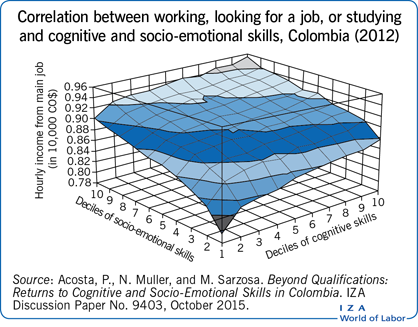Elevator pitch
Common proxies, such as years of education, have been shown to be ineffective at capturing cross-country differences in skills acquisition, as well as the role they play in the labor market. A large body of research shows that direct measures of skills, in particular cognitive and socio-emotional ones, provide more adequate estimations of individuals’ differences in potential productive capacity than the quantity of education they receive. Evidence shows that cognitive skills in particular are quite relevant to explain wages, while socio-emotional skills are more associated with labor force and education participation decisions.

Key findings
Pros
Both cognitive and socio-emotional skills (in particular, conscientiousness and emotional stability) affect labor earnings, although with relatively larger effects for cognitive skills.
Skills, especially socio-emotional ones, influence individuals’ participation in the labor market and probability of holding a job.
Cognitive and socio-emotional skills influence schooling decisions and a range of educational outcomes.
Cons
Surveys may not reflect the full range of an individual’s abilities, and survey instruments are subject to mea-surement errors.
Schooling, cognitive skills, and socio-emotional skills are highly interrelated; distinguishing their respective effects is challenging and can lead to severe estimation bias.
Most causal evidence comes from high-income countries; there is a lack of data on the topic in low- and mid-dle-income countries, especially panel data.